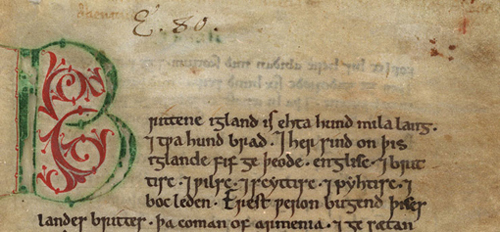The beginnings of English (Part 1)
The English language had been around for about four hundred years before it began to be called English. It first emerged sometime during the fifth century AD, when a number of Germanic tribes from the north of Europe – whom we now refer to collectively as the Anglo-Saxons – arrived in Britain, bringing with them their several indigenous dialects. Over the next few hundred years, as these tribes established roots and began spreading out across the country, the language slowly developed. Yet it was not until the ninth century that the term ‘English’ began to be regularly used to refer to the language (Crystal, 2005, p. 27). English did not become ‘English’ until at least four centuries into its existence.
During this early period of its history, English was just one of many languages spoken on the British mainland. The Anglo-Saxon Chronicles – the earliest history of Britain written in English – begin their account of the country by explaining that:
The island of Britain is eight hundred miles long and two hundred broad. There are five languages, English, Brito-Welsh, Scottish, Pictish and Latin. The first inhabitants of this land were the Britons.
So in the beginning, English was just one language among several; it was a language without a particularly strong identity and with no special status. For the first few centuries of its life, it was very much a local language, spoken by one section of the population of an island off the western coast of continental Europe.

